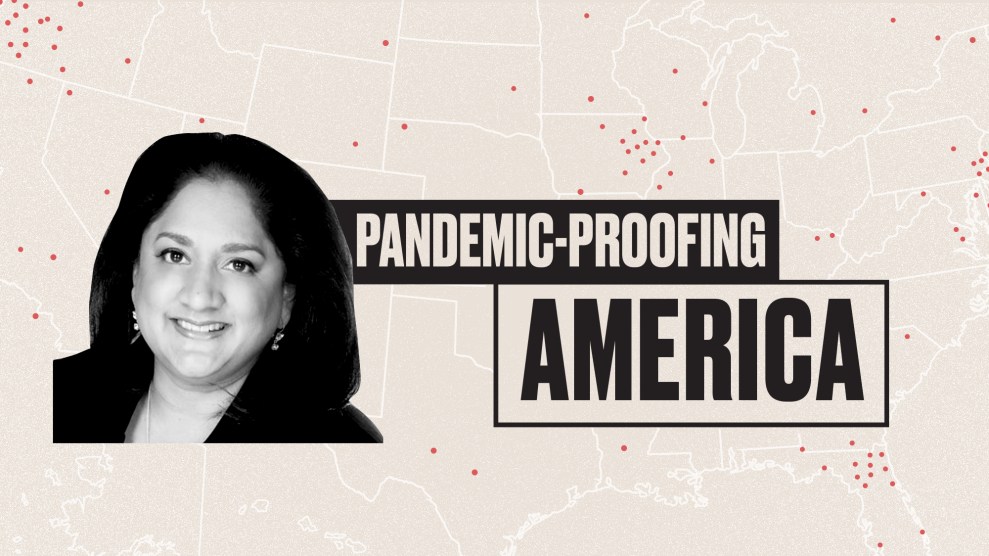
Mother Jones illustration; Courtesy of The Bipartisan Commission on Biodefense
As the world grapples with the devastation of the coronavirus, one thing is clear: The United States simply wasn’t prepared. Despite repeated warnings from infectious disease experts over the years, we lacked essential beds, equipment, and medication; public health advice was confusing, and our leadership offered no clear direction while sidelining credible health professionals and institutions. Infectious disease experts agree that it’s only a matter of time before the next pandemic hits, and that could be even more deadly. So how do we fix what COVID has shown was broken? In this Mother Jones series, we’re asking experts from a wide range of disciplines one question: What are the most important steps we can take to make sure we’re better prepared next time around?
Asha George is a public health security expert who spent four years a congressional staff member with the House Committee on Homeland Security before working as a government contractor for the Department of Homeland Security. As the current executive director of the Bipartisan Commission on Biodefense, she helped prepare a blueprint for how the nation should plan for and respond to an infectious disease outbreak, whether from a naturally occurring pathogen or a biological weapons attacks. She shared some of those recommendations with Mother Jones.
On the need for a stratified hospital system: You know how we have our national trauma hospital system? Every hospital has an emergency room—if you get into an accident, they’re going to take you there. But if you need higher-level treatment, they’re going to fly you to a hospital with a high-level trauma rating. They get reimbursement from Medicare and Medicaid, and then the rest of the health insurance providers follow along with that, too. So we have a system in place for that.
We need to do the same thing for biodefense. Every hospital should be able to take in patients with whatever disease we’re talking about, but if they need more advanced care, there should be other hospitals that can provide that advanced care, and they should get reimbursement for that care from Medicare, Medicaid, and all the other health insurance providers.
When COVID-19 arrived in the United States, all the hospitals wound up self-selecting and arranging themselves into a stratified biodefense hospital system. This is the backwards way to do it. First we have a disease, and then all the hospitals have to respond, and they all kind of sort themselves out. And then somewhere months later, the Centers for Medicare and Medicaid Services decides, okay, so now we’ve decided we’re reimbursing.
I would like CMS to say to hospitals, in order for you to be accredited, you have to maintain a certain level of preparedness for pandemics, for disease events, for emergencies, and so forth. You have to have a certain number of respirators and ventilators. You have to have a certain number of gowns and loves. I think that these emergency preparedness requirements need to be included in their standards. It is an expense, but look at what happened. They wound up spending way more than they ever would have if they’d have been prepared.
On private sector involvement in a biodefense strategy: There’s this whole debate about overdependence on foreign countries for stuff we need, but we have to get used to the notion that we live in a global economy. We do need to increase our capacity in terms of manufacturing here in the United States, so that we’re not entirely dependent on foreign countries for things we need.
In this case with the ventilators, that meant getting the auto manufacturers to produce ventilators instead of cars. That obviously they could do that, and they did do that, but don’t you think it would have been better if they had been prepared in advance to do that? They should be part of that planning.
On government preparedness: The federal government needs to get back on the stick when it comes to the national defense strategy. I think the government needs to stop being in denial about the recurrence of infectious disease outbreaks and pandemics. We need a robust, supported entity inside the White House—not just one person, but a group of people whose job it is to make sure that we are preparing and we’re doing everything we can and managing the entire federal government so that when the next pandemic occurs, when the next biological attack occurs, the federal government can swing into action.
This interview has been edited for length and clarity.



















